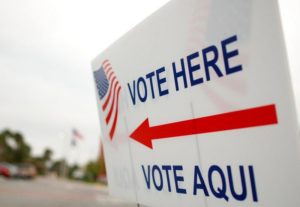
President Trump’s policy that resulted in the separation of parents and children along the southern border may have accomplished something Latino activist groups haven’t before: Prompting a long-term voter registration drive uniting progressive and traditional Democratic groups.
On Thursday, a new coalition led by the nonprofit advocacy group Voto Latino will launch a three-year, multimillion-dollar effort to register Latinos. Despite decades of efforts by liberal-leaning organizations, Latino voters consistently turn out in numbers far lower than other groups and every year, Democrats promise a surge in Latino turnout and spend millions on the cause, only to come up short.
With the national narrative shifting from immigration policy to family separations, progressives believe this time is different. “Multiple organizations are finally talking to each other,” said Wilmer Valderrama, a Hollywood actor and Voto Latino board member. “A lot of this campaign is going to be about educating our young people and sharpening their tools so they understand how to represent their family,” he said.
The coalition was created after Latino interest groups, in a span of six days in June, galvanized over 40 organizations and a host of Hollywood names, including Lena Dunham, Chelsea Handler and Mira Sorvino, to protest a child detention tent city in Texas. However, skeptics say the Latino community is diverse and not everyone has responded the same way to Trump’s border policy; “They keep saying the same thing. ‘They’re really angry and they’re going to turn out’” for Democrats. “But it’s not happening,” said Alfonso Aguilar, president of the Latino Partnership for Conservative Principles.
While eligible Latinos tend to be registered to vote at lower rates, once registered, they participate in greater numbers. According to Pew Research, there are 27 million eligible Latinos, only 16 million are registered, yet 79% of those cast a ballot in the last election. The majority of these voters are young, fluent in English and live off their mobile devices.
“We are basically connecting the Latino network in a way we have not seen,” said Kumar. “Everybody is coming together because there is a level of persecution we’ve never seen,” she said.

Recent Comments